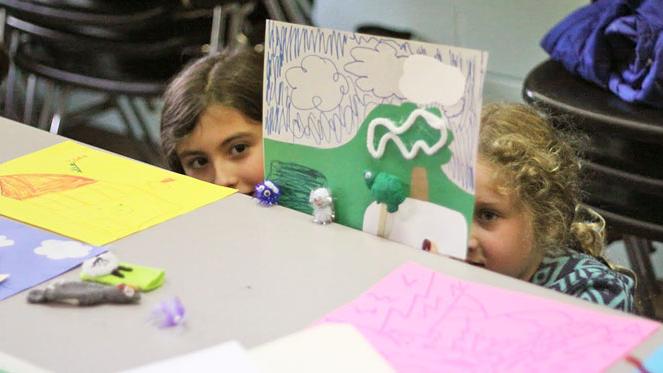Children Perform Folktales at “Cuéntamelo” Showcase

El Círculo Juvenil de Cultura aims to keep Latino children speaking Spanish, familiarize them with their native culture and create a sense of community. The Hispanic Studies outreach program, established in 2007 by Carnegie Mellon University’s Department of Modern Languages, taps into the rich multidisciplinary resources available on the Carnegie Mellon campus—particularly in the arts and technology—to develop biannual workshops like Cuéntamelo.
Cuéntamelo (“Tell it to me”) drew inspiration from Latin American and Hispanic folktales. Children between the ages of five and 12 created stories in many forms, including comics, digital animation, games, theatrical performances, video and an elaborate Rube Goldberg-style storytelling machine.
In early December, Cuéntamelo culminated in a showcase where children shared what they’d learned and created—entirely in Spanish—with friends and family.
Mariana Achugar, associate teaching professor of Hispanic Studies and second language acquisition, reflected on the importance of the sessions in a recent interview with NEXTPittsburgh.
“They see the value of using Spanish when they see other people using it,” Achugar said.
Felipe Gómez, associate teaching professor of Hispanic Studies, co-directs El Círculo with Achugar. His current research on Hispanic and Latino comic books and graphic novels dovetails with the module developed by Juan Fernández, a local comics artist and CMU alumnus who taught the kids about narrative storytelling through comics.
“I’ve found that comics are an especially useful tool for storytelling because they can equally engage children with varying linguistic competence in Spanish,” said Fernández. “They get to tell exciting stories that they have full ownership over while getting better at Spanish.”
Achugar agrees. “Any time they can figure out how to solve a problem or create something, it helps them become more comfortable expressing themselves,” she commented to NEXTPittsburgh.
The workshops rely on the support of CMU undergraduates and community volunteers who develop content to appeal to children of various ages and linguistic profiles—from fully competent bilinguals to children with comprehension but no speaking abilities in Spanish.
Previous workshops have focused on a wide variety of topics including digital literacy, the environment, food, music and dance.